Cogen Bohanec, MA, PhD
Back To Faculty



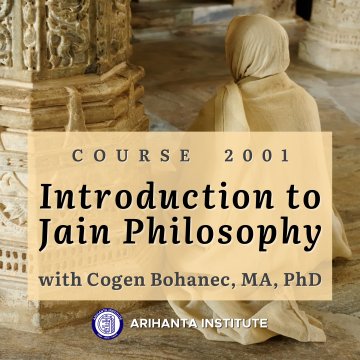
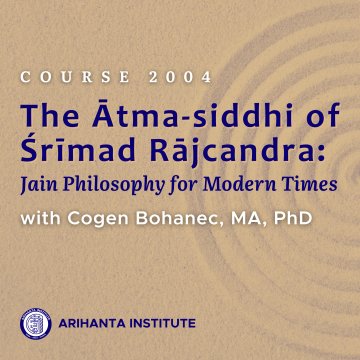
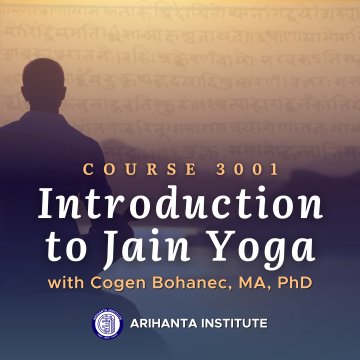


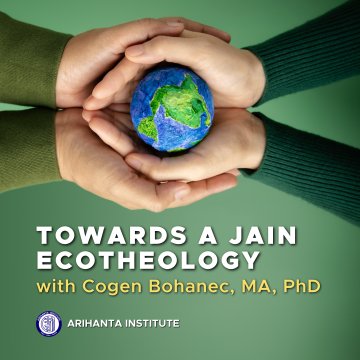
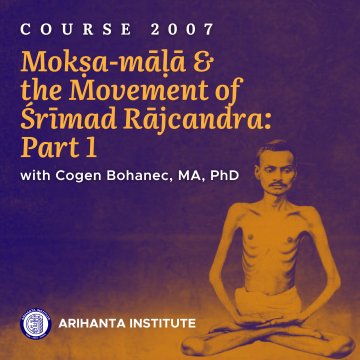
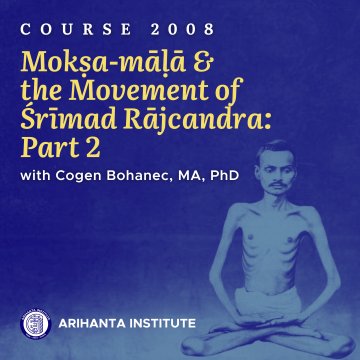
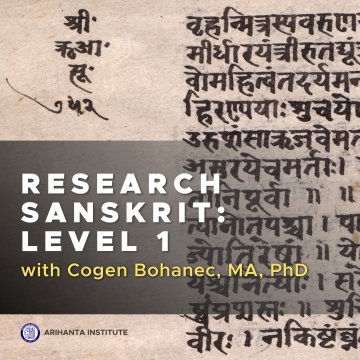
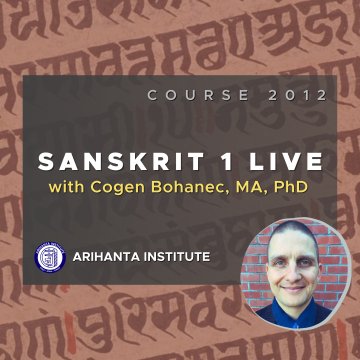
 Coming Fall 2025
Coming Fall 2025
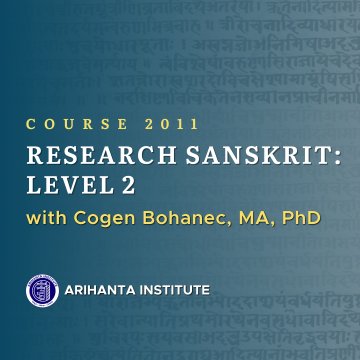
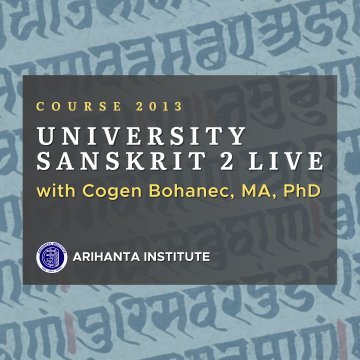
 16-week Live Course: January 27 - May 16, 2025
16-week Live Course: January 27 - May 16, 2025
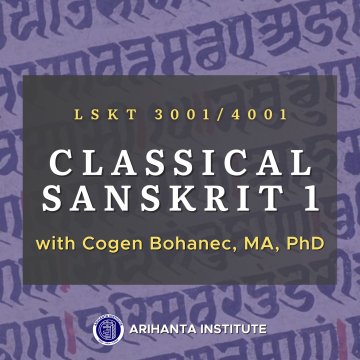
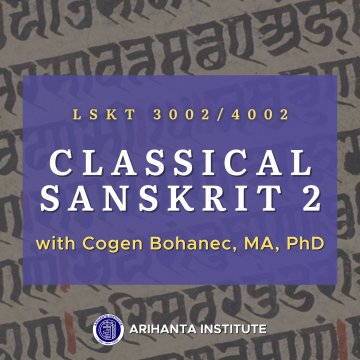

Cogen Bohanec, MA, PhD
Assistant Professor in Sanskrit & Jain Studies, Arihanta Institute
MA Faculty
Welcome Video

Cogen Bohanec currently holds the position of Assistant Professor in Sanskrit and Jain Studies at Arihanta Institute where he teaches various courses on Jain philosophy and its applications. In addition, he is a Visiting Assistant Professor at Claremont School of Theology (CST) where he teaches Sanskrit and Gujarati, and he has taught numerous classes on South Asian Culture & Religions and Sanskrit language at the Graduate Theological Union (GTU) in Berkeley. Dr. Bohanec specializes in the Jain and Hindu traditions, comparative dharma traditions, philosophy of religion, theo-ethics (virtue ethics, and environmental and animal ethics in particular), and Sanskrit language and literature, and has numerous publications in those areas, particularly in the fields of Jain and Hindu Studies amongst other disciplines. He has a PhD in “Historical and Cultural Studies of Religion” with an emphasis in Hindu Studies from GTU, where his research emphasized ancient Indian languages, literature, and philosophical systems. He also holds an MA in Buddhist Studies from the Institute of Buddhist Studies at GTU where his research primarily involved translations of Pāli Buddhist scriptures in conversation with the philology of the Hindu Upaniṣads. He is the author of “Bhakti Ethics, Emotions and Love in Gauḍīya Vaiṣṇava Metaethics” (Lexington, 2024), an interdisciplinary study that frames traditional Hindu themes of ecotheology, ecofeminist theology, feminist care ethics, within a framework of virtue ethics in conversation with a bhakti-based psychology of emotions. Currently he is largely engaged in publication and research on various aspects of the Jain tradition, emphasizing translations and analyses of Jain Sanskrit, Prakrit, and Gujarati texts, but is also publishing academic works on various topics within the Hindu tradition.
Research
In general, Dr. Bohanec’s scholarship focuses on the comparative philosophies between major dharma traditions (Jain dharma, Buddhism, Hinduism), within these traditions, and in dialogue with Western theoretical frameworks. He specializes in Sanskrit and Indian literature but has engaged in textual research in a variety of languages such as Pāli, Gujarati, Hindi, Bengali and Ardhamāgadhī. By employing methods of textual hermeneutics, philology, literary criticism, and translation, Dr. Bohanec seeks to nuance the academic understanding of dharma traditions by employing the lexicon of Western philosophy in a way that is vigilant against the possibility of distorting these traditions yet renders them more accessible to the Western milieu. His research in Jain studies focuses on Jain philosophy of language and mantras, Jain ethics (particularly virtue ethics, and ecotheological and animal ethics), modern Jain ācāryas (Śrīmad Rājcandra, and Ācārya Suśīl Kumār in particular), Jain yoga texts, interfaith dialogue and peacebuilding, and comparative Jain and Gandhian studies, amongst other topics.
Dr. Bohanec’s published books include his monograph, “Bhakti Ethics, Emotions and Love in Gauḍīya Vaiṣṇava Metaethics” (Lexington, 2024) which is a refurbished excerpt from his PhD dissertation (“Process and Dialectic in Hindu Thought: Gaudiya Vaiṣṇava Systematic Theology and Ethics”). He was the editor for “An Introduction to Jain Philosophy” (D.K. Printworld, 2019), a book by Dr. Parveen Jain (Arihanta Institute) based on the translations of Ācārya Suśīl Kumār, and was also Co-Editor in Chief (with Dr. Rita Sherma and Dr. Purushottama Bilimoria of the Graduate Theological Union) for “Contemplative Studies and Jainism: Meditation, Devotion, Prayer, and Worship” (Routledge, 2023). In addition, he has fourteen other academic publications of journal articles and book chapters, and several other non-academic publications, and several more academic in the works.
Current book publication projects include his work as a co-editor on an academic volume with Dr. Christopher Jain Miller (Arihanta Institute/Claremont School of Theology) entitled “Engaged Jainism: Critical and Constructive Studies of Jain Social Engagement” (SUNY, 2025). He is also the co-author with Dr. Parveen Jain on an upcoming book, “The Philosophy Behind the Universal Jñāna Embedded in Mantras: Based on the Notes Dictated by Ācārya Suśīl Kumār” (D.K. Printworld, 2025) which investigates a Jain theory of mantra and philosophy of language. Dr. Bohanec is currently researching and writing three other books including “The Live and Teachings of Śrīmad Rājcandra: The Profound Bhakti of a Modern Jain Ācārya” which provides an overview of various themes in the life of Śrīmad Rājcandra (1867-1901) and shows how his writings underscore those themes, Jain Yoga Philosophy: Pragmatism as a Method for Interfaith Peacebuilding,” a philosophical engagement with various Jain yoga texts that proposes a yoga as a Jain model of interfaith dialogue, and an upcoming primer in “Research Gujarati” that he is co-authoring with Dr. Venu Mehta (Claremont School of Theology).
Publications
2023 | Contributing Author & Co-Editor in Chief | Volume 2: Contemplative Studies and Jainism: Meditation, Devotion, Prayer, and Worship | Routledge | Completed, available in Print
2023 | “Pan-Dharmic Yoga: Comparative Meditative Praxis in the Jain Yoga-Śāstra of Hemacandra and the Hindu Yoga Sūtra of Patañjali” | Contemplative Studies and Hinduism:
Meditation, Devotion, Prayer, and Worship | Routledge
2019 | Editor & Research/Translator Assistant | An Introduction to Jain Philosophy: Based on Writings and Discourses by Ācārya Sushil Kumar, by Parveen Jain, PhD | D.K.
Printworld |
2023 | “Book Review: Māyā in the Bhāgavata Purāṇa: Human Suffering and Divine Play. By Gopal K. Gupta | Journal of Hindu Studies
2023 | “A Theocentric Argument for Animal Personhood in the Caitanya-caritāmṛta” | Journal of Dharma Studies | Springer |
2023 | “Towards A Jain Ecotheology” | Ecology & Indian Philosophy: Hindu, Jain, and Yoga Perspectives on Climate and Environmental Mitigation | Routledge | Accepted, Forthcoming
2023 | “Bhaktivedānta, Gandhi, and the Social Implications of Nonviolence” | Ahiṃsā in India: Diverse Traditions of Nonviolence | Lexington | Accepted, Forthcoming
2023 | “Kīrtana as Meditation: A Gauḍīya Vaiṣṇava Theory on Sound and Language” | Contemplative Studies and the Arts of Yoga: Contemporary Approaches | Routledge | Accepted, Forthcoming
2021 | “A Dialogical Encounter between Christian Ecotheological Ethics and Gauḍīya Vaiṣṇava Theology” | Sustainable Societies: Interreligious, Interdisciplinary Responses | Springer
2021 | “Bhaktivedānta Swami and Buddhism: A Case Study for Interfaith Dialogue and Peacebuilding” | The Journal of Dharma Studies | Springer
2020 | “Semiotics and Illocution in Gauḍīya Sādhana” | Contemplative Studies and Hinduism: Meditation, Devotion, Prayer, and Worship | Routledge
2018 | “Ecotheology, Animal Rights, and the Śrīmad Bhāgavatam” | Journal of Vaishnava Studies | Volume 26, NO.2 | Spring 2018, 17-33
2023 | Animal Ethics | “Spiritual Bypass and Manipulation in DIY Slaughter” | The Humane Hoax Anthology | Contributing Author | New York: Lantern Books
2013 | Animal Ethics | The Ultimate Betrayal: Is There Happy Meat? | Co-author | Bloomington: iUniverse
2023 | “Pan-Dharmic Yoga: Comparative Meditative Praxis in the Jain Yoga-Śāstra of Hemacandra and the Hindu Yoga Sūtra of Patañjali” | Contemplative Studies and Hinduism:
Meditation, Devotion, Prayer, and Worship | Routledge
2019 | Editor & Research/Translator Assistant | An Introduction to Jain Philosophy: Based on Writings and Discourses by Ācārya Sushil Kumar, by Parveen Jain, PhD | D.K.
Printworld |
2023 | “Book Review: Māyā in the Bhāgavata Purāṇa: Human Suffering and Divine Play. By Gopal K. Gupta | Journal of Hindu Studies
2023 | “A Theocentric Argument for Animal Personhood in the Caitanya-caritāmṛta” | Journal of Dharma Studies | Springer |
2023 | “Towards A Jain Ecotheology” | Ecology & Indian Philosophy: Hindu, Jain, and Yoga Perspectives on Climate and Environmental Mitigation | Routledge | Accepted, Forthcoming
2023 | “Bhaktivedānta, Gandhi, and the Social Implications of Nonviolence” | Ahiṃsā in India: Diverse Traditions of Nonviolence | Lexington | Accepted, Forthcoming
2023 | “Kīrtana as Meditation: A Gauḍīya Vaiṣṇava Theory on Sound and Language” | Contemplative Studies and the Arts of Yoga: Contemporary Approaches | Routledge | Accepted, Forthcoming
2021 | “A Dialogical Encounter between Christian Ecotheological Ethics and Gauḍīya Vaiṣṇava Theology” | Sustainable Societies: Interreligious, Interdisciplinary Responses | Springer
2021 | “Bhaktivedānta Swami and Buddhism: A Case Study for Interfaith Dialogue and Peacebuilding” | The Journal of Dharma Studies | Springer
2020 | “Semiotics and Illocution in Gauḍīya Sādhana” | Contemplative Studies and Hinduism: Meditation, Devotion, Prayer, and Worship | Routledge
2018 | “Ecotheology, Animal Rights, and the Śrīmad Bhāgavatam” | Journal of Vaishnava Studies | Volume 26, NO.2 | Spring 2018, 17-33
2023 | Animal Ethics | “Spiritual Bypass and Manipulation in DIY Slaughter” | The Humane Hoax Anthology | Contributing Author | New York: Lantern Books
2013 | Animal Ethics | The Ultimate Betrayal: Is There Happy Meat? | Co-author | Bloomington: iUniverse
Cogen Bohanec, MA, PhD's Courses
Self-paced

1002 | Yoga and Meditation for Daily Life – Stress Management
This class seeks to bring the conceptual framework of the textual tradition of Jain Yoga to life by engaging in contemplative practices that have been practiced since ancient times across Dharma Traditions.
$99.00 USD
Instructor
Self-paced

2001 | Introduction to Jain Philosophy
Added to cart
2001 | Introduction to Jain Philosophy
Refresh your understanding of Jain philosophy or embark on a journey to learn Jain philosophy from the ground up as you survey the Jain tradition’s fundamental philosophical insights
$99.00 USD
Instructor
Self-paced

2004 | The Ātma-siddhi of Śrīmad Rājcandra: Jain Philosophy for Modern Times
This course will provide an overview of Jain Dharma based on an important text of the venerated Jain preceptor, Śrīmad Rājcandra. The trajectory of concepts covers Śrīmad’s philosophical proofs for the existence of an eternal soul as an agent, in relationship to bondage and liberation from karma. The approach of this course will be an analysis of these concepts in terms of various categories of philosophy with an inclination towards comparative religion and interfaith dialogue.
$99.00 USD
Instructor
Self-paced

3001 | Introduction to Jain Yoga
Added to cart
3001 | Introduction to Jain Yoga
Unpack the ancient and venerable textual tradition of Jain yoga. Explore the theory behind the psychology and contemplative states of Jain yoga. Study the vocabulary and conceptual frameworks of the Jain yoga tradition.
$99.00 USD
Instructor
Self-paced

3003 | The Bhagavad Gītā: A Jain Perspective
Added to cart
3003 | The Bhagavad Gītā: A Jain Perspective
Engage in a deep interfaith dialogue between Jain Dharma and the Bhagavad-gītā (generally considered to be a Hindu text) by following the basic principles of interfaith dialogue and peacebuilding that are paradigmatic to a variety of sources in the Jain tradition (e.g. the works of Haribhadrasūri, Hemacandra, and Śrīmad Rājchandra). Examine the shared understandings of yoga practice between Jain traditions and that which is advocated in the Bhagavad-gītā, while also underscoring the doctrinal uniqueness of Jain Dharma in terms of metaphysics, epistemology, divinity, and other philosophical concepts. The result is an approach to religious pluralism that advocates for friendship between diverse traditions by showing how a Jain reading of the Bhagavad-gītā can provide a foundation for mutual respect and the valuation of religious and spiritual diversity.
$99.00 USD
Instructor
Self-paced

1007 | Peacebuilding & Interfaith Dialogue in the Jain Tradition
In this course we will explore how we can talk with others from different religious (or non-religious) traditions in a way that fosters friendship and mutual respect. We will discuss the Jain tradition’s many resources that further the goals of peacebuilding in a pluralistic society, and what it means to create social unity despite the diversity of perspectives in various belief systems. Given the history of interfaith conflict and violence in our world, the Jain tradition has much to offer in terms of how understanding the religious (or non-religious) “other” and how dialoguing with those who have fundamentally different beliefs can be a source of friendship, harmony, and strength, rather than conflict and disunity as it so often is.We will also discuss how such interfaith dialogue can be understood not only in social terms, but in the Jain philosophical terms of anekānta-vāda, ahiṃsā, etc. such that interfaith interactions can be a means of our own personal spiritual development—as well as social unity at a time when people seem more polarized than ever. We will also give particular emphasis to how the Jain tradition has employed a shared framework of yoga to dialogue with other dharma traditions, and what this tells us today about the potential for interfaith, intercommunal peacebuilding from the perspective of the Jain tradition.
$99.00 USD
Instructor
Self-paced

1010 | Towards a Jain Ecotheology
Added to cart
1010 | Towards a Jain Ecotheology
For millennia, it has been widely recognized that the Jain tradition has been distinctive in its central focus on nonviolence (ahiṃsā) towards all beings (jīva-s). Because of this, Jain theology is uniquely oriented towards healing humanity’s strained relationship with the natural world. For several decades, the field of ecotheology had been developed by various thinkers from multiple world religious traditions, Christian in particular.In this course, we will articulate a clear understanding of the methodology of ecotheology that can provide a framework where religious traditions might effectively advocate and empower ecological healing based on the unique paradigmatic resources of each tradition. This course will then examine what the Jain tradition might contribute to the bourgeoning academic discipline of ecotheology, and how the Jain tradition can play an important, necessary, and unique role in a pluralistic approach to environmental healing.
$99.00 USD
Instructor
Self-paced

2007 | Mokṣa-māḷā & the Movement of Śrīmad Rājcandra: Part 1
Śrīmad Rājcandra (1867-1901) was an important Jain Saint of the late 19th and early 20th centuries who founded a distinct and modern, yet also in many ways quite orthodox, movement of Jainism. While Śrīmad and his followers followed many mainstream Jain teachings and practices, his teachings and the tradition that grew from them are distinct with regards to their emphasis on nonsectarianism, the ability to attain self-realization as a profound experience of one’s spiritual essence in this life or shortly thereafter, understanding of liberation as an attainable goal within 15 lifetimes, a critique of contemporary institutions of mendicancy, and the uniqueness of a bourgeoning lay movement where lay practitioners are the primary source of spiritual authority—a feature that has been widely appealing to Jain lay practitioners. The first half of this two-part course will examine how the events of Śrīmad’s life gave shape to this movement and will look at the philosophical underpinnings of Śrīmad’s tradition based on the Mokṣa-māḷā, a Gujarati text that he composed in 1887, at the age of 20, the same year that he was married, and several years before he attained self-realization and renounced worldly life. In the first half of this course, we will focus primarily on how Śrīmad’s philosophy was informed by notable events in his life, and how in turn these events and this philosophy have influenced the development of the Raj Bhakta Marg, the tradition that has developed from this important modern Jain guru. Learning Objectives:Learn the basic biographical outline of the life of Śrīmad Rajcandra.Understand the social and biographical events that led to the development of the Raj Bhakta Marga.Examine key features of the Raj Bhakta Marga that make it a unique modern Jain movement.
$99.00 USD
Instructor
Self-paced

2008 | Mokṣa-māḷā & the Movement of Śrīmad Rājcandra: Part 2
As we have seen in the first half of this course, Śrīmad Rājcandra was an important Jain Saint of the late 19th and early 20th centuries who founded adistinct and modern, yet also in many ways quite orthodox, movement of Jainism known as the Raj Bhakta Marg. In the first half of this course, we focused primarily on how Śrīmad Rājcandra’s (1867-1901) philosophy was informed by notable events in his life, and how in turn these events and this philosophy have influenced the development of the Raj Bhakta Marg. In the second half of this class we will examine the features of Śrīmad’s philosophy in greater depth based primarily on the writings of the Mokṣa-māḷā (1887), but occasionally examining his Ātma-siddhi Śāstra (1896) as well. Moreover, we will examine the central concept of guru bhakti and discuss the importance of understanding Jain bhakti both within Śrīmad’s thought and tradition,but also within Jainism more broadly. We will closely examine how Śrīmad discussed various features of spiritual practice such as the importance of mantra recitation, sāmāyika and dhyāna meditation, and other practices intended to remove one’s karma and give one a direct experience of one’s spiritual essence. Finally, we will unpack the concise and elegant arguments that Śrīmad offers for the existence of an eternal soul—all discussions intended to both edify and inspire practitioners to dedicate themselves to an ardent spiritual practice where one might hope to attain self-realization and even liberation within 15 lifetimes—a significantly more attainable and immediate goal than what is often understood by many in the Jain tradition. Learning Objectives:Read and reflect on the teachings of Śrīmad’s Mokṣa-māḷā regarding themes of self-realization, bhakti, religious practices, and philosophical discourses including logical proofs for the existence of a soul.Understand the importance of Śrīmad’s emphasis of attaining self-realization and liberation, and how this relates to understanding him as a reformer or a revivalist.Examining key features of bhakti, especially guru bhakti, in the Śrīmad tradition and how this might inform a broader understanding of the importance and role of bhakti in the Jain tradition more broadly.Examine key features of religious practice advocated by Śrīmad and widely practiced by his followers including mantra recitation, sāmāyika, dhyāna, and guru-bhakti.Take time to reflect on philosophical principles of Śrīmad and applicability into daily life.Inquire into the deeper meanings and implications of the Śrīmad’s teachings in dialogue with other Jain teachings and other religious traditions.
$99.00 USD
Instructor
Self-paced

2010 | Research Sanskrit: Level 1
Added to cart
2010 | Research Sanskrit: Level 1
** This asynchronous, "self-study" course is self-paced and without live instruction. It is best suited for those who have some familiarity with Sanskrit or experience in learning other languages. For those wishing to study in a scheduled, live setting with a university professor, please enroll in 2012 | University Sanskrit 1 Live ** Competency with Sanskrit translation is a key skill for academics in the field of South Asian Studies. It is one of the most important research skills that provides scholars access to resources that are the object of their research. It is also a skill that, when demonstrated with translations in one's publications, gives a great deal of credibility to the academic work of scholars. Sanskrit can also be very helpful to strengthen and deepen one's connection to one's own spiritual tradition. For most Dharma traditions (Jainism, Hinduism, Buddhism, and Yoga), Sanskrit is often the medium of liturgical practices, and Sanskrit texts which tend to form the doctrinal, philosophical, and practical foundation for individual and collective spiritual practices in those traditions. Dharma traditions are deep reservoirs of spiritual wisdom that have the power to transform us personally and collectively in profound ways, and Sanskrit is one of the most important keys to unlocking that great reservoir of ancient spiritual wisdom that is much needed in our own personal lives, and in our collective society at large. In this self-study course, students will gain the important research skills necessary to translate Sanskrit texts by translating modified excerpts from Sanskrit literature. These research skills include basic philology such as etymology, the ability to identify inflexions and grammatical forms, and syntactical analyses. Asynchronous Sanskrit Training2010 | Research Sanskrit: Level 1 is a self-study, asynchronous course. It is the first of a two course series (2010 | Research Sanskrit: Level 1 and 2011 | Research Sanskrit: Level 2) offered by Professor Cogen Bohanec, MA, PhD and Arihanta Institute. Upon completion of both courses, students can expect to complete the Devavāṇīpraveśikā Sanskrit primer (Goldman and Goldman, 1980). In the process, students will learn to memorize, recognize, and recall all major paradigms of inflection (conjugations, declensions, indeclinable suffixes, prefixes, etc.) and use these skills when translating, reading, memorizing, or liturgically reciting Sanskrit texts. The option of asynchronous Sanskrit training is intended as an accessible learning option for self-motivated students who thrive in a self-paced learning environment. Students can move through the course material at their own pace, based on their ability and schedule. Since there are no live classes or synchronous instruction, and given the complexity of the subject matter, students will derive most benefit if they have previously studied Sanskrit, or if they are strongly committed to a daily routine of continued self-study over the course of a year or two, or perhaps longer (keeping in mind that when learning a new language, one should work through a primer more than once). This course may also be useful as a supplement for Sanskrit students who are enrolled in a Sanskrit studies university program, particularly if that course is using the Devavāṇīpraveśikā as a primer. Here, the two course series - 2010 | Research Sanskrit: Level 1 and 2011 | Research Sanskrit: Level 2 - can serve as a tutorial for research skills in basic philology (see “Learning Objectives” section below). Additionally, students who have previously participated in a Sanskrit program and are looking for a practical review, this course series provides a succinct and comprehensive opportunity to reinforce the necessary skills.Learning ObjectivesLearn to read Sanskrit in Devanagari font.Acquire basic Sanskrit vocabulary.Learn to identify and understand the basic grammatical forms covered in class.Learn to understand key differences between Sanskrit and English syntaxes and to be able to convert Sanskrit syntax into English syntax.Learn basic skills for translation of Sanskrit primary sources for researchBecome familiarized with other cultural and intellectual elements of the broader Sanskrit tradition.
$99.00 USD
Instructor
Upcoming

2012 | University Sanskrit 1 Live
Added to cart
2012 | University Sanskrit 1 Live
This synchronous, "live" online course is a 16-week seminar for those wishing to study Sanskrit in a scheduled, live setting with a university professor (class meets twice a week). For those looking to study in a self-paced, asynchronous course, please enroll in 2010 | Research Sanskrit: Level 1. In this course, which is the first of a two course series, students will complete the equivalent of their first semester of graduate level Sanskrit. Students will gain necessary competency for Sanskrit 1 as well as the important research skills necessary to translate Sanskrit texts by translating modified excerpts from Sanskrit literature. These research skills include basic philology such as etymology, the ability to identify inflexions and grammatical forms, and syntactical analyses. This course will be divided into two sections. Upon completion of both of these sections, we will have completed the Devavāṇīpraveśikā Sanskrit primer (Goldman and Goldman, 1980). In the process, students will learn to memorize, recognize, and recall all major paradigms of inflection (conjugations, declensions, indeclinable suffixes, prefixes, etc.) and use these skills when translating, reading, memorizing, or liturgically reciting Sanskrit texts. Competency with Sanskrit translation is a key skill for academics in the field of South Asian Studies. It is one of the most important research skills that gives scholars access to resources that are the object of their research, and it is also a skill that, when demonstrated with translations in one’s publications, gives a great deal of much needed credibility to the academic work of scholars. Sanskrit can also be very helpful to strengthen and deepen one’s connection to one’s own spiritual tradition. For most Dharma traditions (Jainism, Hinduism, and Buddhism), Sanskrit is often the medium of liturgical practices, and Sanskrit texts also tend to form the doctrinal, philosophical, and practical foundation for individual and collective spiritual practices in those traditions. Dharma traditions are deep reservoirs of spiritual wisdom that have the power to transform us personally and collectively in profound ways, and Sanskrit is on one of the most important keys to unlocking that great reservoir of ancient spiritual wisdom that is much needed in our own personal lives, and in our collective society at large. Learning ObjectivesLearn to read Sanskrit in Devanagari font.Acquire basic Sanskrit vocabulary.Learn to identify and understand the basic grammatical forms covered in class.Learn to understand key differences between Sanskrit and English syntaxes and to be able to convert Sanskrit syntax into English syntax.Learn basic skills for translation of Sanskrit primary sources for researchBecome familiarized with other cultural and intellectual elements of the broader Sanskrit tradition.
 Coming Fall 2025
Coming Fall 2025$500.00 USD
Instructor
Self-paced

2011 | Research Sanskrit: Level 2
Added to cart
2011 | Research Sanskrit: Level 2
** This asynchronous, "self-study" course is the second level of self-paced Sanskrit and without live instruction. It is best suited for those who have completed 2010 Research Sanskrit: Level 1 and have some familiarity with Sanskrit or experience in learning other languages.**Competency with Sanskrit translation is a key skill for academics in the field of South Asian Studies. It is one of the most important research skills that provides scholars access to resources that are the object of their research. It is also a skill that, when demonstrated with translations in one's publications, gives a great deal of credibility to the academic work of scholars. Sanskrit can also be very helpful to strengthen and deepen one's connection to one's own spiritual tradition. For most Dharma traditions (Jainism, Hinduism, Buddhism, and Yoga), Sanskrit is often the medium of liturgical practices, and Sanskrit texts which tend to form the doctrinal, philosophical, and practical foundation for individual and collective spiritual practices in those traditions. Dharma traditions are deep reservoirs of spiritual wisdom that have the power to transform us personally and collectively in profound ways, and Sanskrit is one of the most important keys to unlocking that great reservoir of ancient spiritual wisdom that is much needed in our own personal lives, and in our collective society at large. In this self-study course, students will gain the important research skills necessary to translate Sanskrit texts by actually translating modified excerpts from Sanskrit literature. These research skills include basic philology such as etymology, the ability to identify inflexions and grammatical forms, and syntactical analyses. Asynchronous Sanskrit Training2011 | Research Sanskrit: Level 2 is a self-study, asynchronous course. It is the second of a two course series (2010 | Research Sanskrit: Level 1 and 2011 | Research Sanskrit: Level 2) offered by Professor Cogen Bohanec, MA, PhD and Arihanta Institute. Upon completion of both of these courses, students can expect to complete the Devavāṇīpraveśikā Sanskrit primer (Goldman and Goldman, 1980). In the process, students will learn to memorize, recognize, and recall all major paradigms of inflection (conjugations, declensions, indeclinable suffixes, prefixes, etc.) and use these skills when translating, reading, memorizing, or liturgically reciting Sanskrit texts. The option of asynchronous Sanskrit training is intended as an accessible learning option for self-motivated students who thrive in a self-paced learning environment. Students can move through the course material at their own pace, based on their own ability and schedule. Since there are no live classes or synchronous instruction in this course, and given the complexity of the subject matter, students will derive most benefit from this course if they have already studied Sanskrit in a previous course, or if they are strongly committed to a daily routine of continued self-study over the course of at least a year or two, or perhaps longer (keeping in mind that when learning a new language, one should work through a primer more than once). This course may also be useful as a supplement for Sanskrit students who are enrolled in a Sanskrit studies university program, particularly if that course is using the Devavāṇīpraveśikā as a primer. Here, the two course series - 2010 | Research Sanskrit: Level 1 and 2011 | Research Sanskrit: Level 2 - can serve as a tutorial for research skills in basic philology (see “Learning Objectives” section below). Additionally, students who have previously participated in a Sanskrit program and are looking for a practical review, this course series provides a succinct and comprehensive opportunity to reinforce the necessary skills. Learning ObjectivesLearn to read Sanskrit in Devanagari font.Acquire basic Sanskrit vocabulary.Learn to identify and understand the basic grammatical forms covered in class.Learn to understand key differences between Sanskrit and English syntaxes and to be able to convert Sanskrit syntax into English syntax.Learn basic skills for translation of Sanskrit primary sources for research.Become familiarized with other cultural and intellectual elements of the broader Sanskrit tradition.
$99.00 USD
Instructor
Live Online

2013 | University Sanskrit 2 Live
Added to cart
2013 | University Sanskrit 2 Live
**This synchronous, "live" online course is a university length (16-week) seminar for those wishing to study Sanskrit in a scheduled, live setting with a university professor (class meets twice a week, Mondays and Fridays at 9:30 a.m. - 10:55 a.m. Pacific). For those looking to study in a self-paced, asynchronous course, please enroll in 2011 | Research Sanskrit: Level 2** In this course, which is Part 2 of 2 (see Course 2012 for first part), students will complete the equivalent of their second semester of graduate level Sanskrit. Students will gain necessary competency for Sanskrit 2 as well as the important research skills necessary to translate Sanskrit texts by translating modified excerpts from Sanskrit literature. These research skills include basic philology such as etymology, the ability to identify inflexions and grammatical forms, and syntactical analyses. Upon completion of this course (and its prerequisite Course 2012), we will have completed the Devavāṇīpraveśikā Sanskrit primer (Goldman and Goldman, 1980). In the process, students will learn to memorize, recognize, and recall all major paradigms of inflection (conjugations, declensions, indeclinable suffixes, prefixes, etc.) and use these skills when translating, reading, memorizing, or liturgically reciting Sanskrit texts. Competency with Sanskrit translation is a key skill for academics in the field of South Asian Studies. It is one of the most important research skills that gives scholars access to resources that are the object of their research, and it is also a skill that, when demonstrated with translations in one’s publications, gives a great deal of much needed credibility to the academic work of scholars. Sanskrit can also be very helpful to strengthen and deepen one’s connection to one’s own spiritual tradition. For most Dharma traditions (Jainism, Hinduism, and Buddhism), Sanskrit is often the medium of liturgical practices, and Sanskrit texts also tend to form the doctrinal, philosophical, and practical foundation for individual and collective spiritual practices in those traditions. Dharma traditions are deep reservoirs of spiritual wisdom that have the power to transform us personally and collectively in profound ways, and Sanskrit is on one of the most important keys to unlocking that great reservoir of ancient spiritual wisdom that is much needed in our own personal lives, and in our collective society at large. Learning Objectives:1. Learn to read Sanskrit in Devanagari font.2. Acquire basic Sanskrit vocabulary.3. Learn to identify and understand the basic grammatical forms covered in class.4. Learn to understand key differences between Sanskrit and English syntaxes and to be able to convert Sanskrit syntax into English syntax.5. Learn basic skills for translation of Sanskrit primary sources for research.6. Become familiarized with other cultural and intellectual elements of the broader Sanskrit tradition.
 16-week Live Course: January 27 - May 16, 2025
16-week Live Course: January 27 - May 16, 2025$500.00 USD
Instructor
Graduate Course

Classical Sanskrit 1
Added to cart
Classical Sanskrit 1
Sanskrit 1 will complete the first half of the Devavāṇīpraveśikā Sanskrit primer (Goldman and Goldman, 1980). In the process, students will learn to memorize, recognize, and recall all major paradigms of inflection (conjugations, declensions, indeclinable suffixes, prefixes, etc.). Students will gain the important research skills of basic philology such as etymology and syntactical analyses while translating modified excerpts from Sanskrit literature. Students will also memorize important Sanskrit verses designed to enhance basic vocabulary and impart familiarity with the cultural, philosophical, and linguistic landscape of Sanskrit literature.
Instructor
Graduate Course

Classical Sanskrit 2
Added to cart
Classical Sanskrit 2
Sanskrit 2 will complete the second half of the Devavāṇīpraveśikā Sanskrit primer (Goldman and Goldman, 1980). In the process, students will learn to memorize, recognize, and recall all major paradigms of inflection (conjugations, declensions, indeclinable suffixes, prefixes, etc.). Students will gain the important research skills of basic philology such as etymology and syntactical analyses while translating modified excerpts from Sanskrit literature. Students will also memorize important Sanskrit verses designed to enhance basic vocabulary and impart familiarity with the cultural, philosophical, and linguistic landscape of Sanskrit literature.
Instructor
Enrollment Options
14-DAY FREE TRIAL
- Free, unlimited access to our self-paced courses for 14-days.
- Already used your free trial? Enroll in our Monthly or Annual Membership options at anytime and continue learning immediately!
MONTHLY MEMBERSHIP
- $45 USD / Month
- Immediate access to course #### | Name.
- Unlimited access to our live and self-paced courses for one month, with month-to-month auto rollover.
- Excludes graduate seminars and language courses.

 Cogen Bohanec, MA, PhD
Cogen Bohanec, MA, PhD